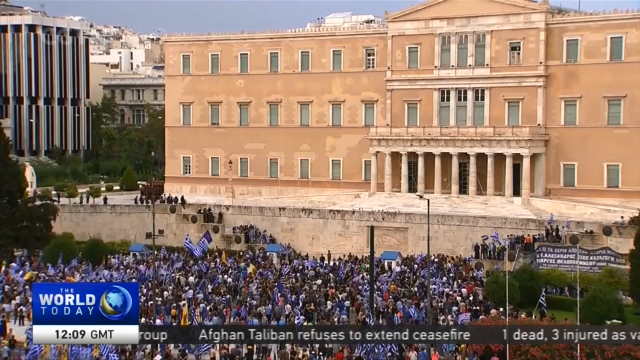
20:31, 18-Jun-2018
Macedonia Name Deal: Greece and Macedonia sign pact on name of ex-Yugoslav republic
03:21

Macedonia and Greece signed a landmark deal, taking a big step toward solving a three-decade-long naming dispute. But a lengthy legal fight still lies ahead. In the meantime, Macedonia expects immediate results, specifically invitations to join the European Union and NATO. CGTN's Aljosa Milenkovic is in Macedonia's capital.
To join NATO or not to join NATO has never been the question for Macedonia from the first day it gained independence back in 1991. That's the official position of the vast majority of political parties here, including the ruling Social Democrats.
RADMILA SEKERINSKA MINISTER OF DEFENSE OF MACEDONIA "Stabilizing the Balkans has always been the best recipe for stabilizing and securing a peaceful European continent. We do believe that Macedonia's integration into NATO will definitely provide guarantees for stability and prosperity of the region."
But the obstacle blocking Macedonia's membership to NATO had been neighboring Greece's objection to using the name Macedonia at all. Greece has a northern province called Macedonia that dates back to Alexander the Great. Greece considers Macedonia part of its history. The two sides eventually agreed to the name Republic of North Macedonia.
The negotiations between the two countries lagged for years despite promises and potential membership invitations from both the EU and NATO. But recent snap elections changed things dramatically. The new Macedonian government decided it was ready to pay any price to enter the NATO club. It was a move praised by the U.S. at a recent meeting between the top Macedonian and U.S. defense officials.
JAMES MATTIS US DEFENSE SECRETARY "Today's security environment requires the spirit of amity among all who stand for freedom, of basic human rights and respect of the international rule of law. And I must applaud to Macedonia's resistance to Russia's malign influence in the Balkans, and I welcome your continued leadership by example in this region."
And while most of the political parties here do support NATO membership, they are not happy with the price Macedonia has to pay in signing what they call a toxic agreement with Greece.
NAUM STOIKVOSKI VMRO-DPMNE SPOKESMAN "Would any country in the world accept abolishing itself in this manner, would any nation accept self-erasing its own history, tradition, culture, its own feeling of self-identification for the account of any kind of membership aspirations?"
The main opposition party in Macedonia accuses the government for what it claims is "treason of national interests".
ALJOSA MILENKOVIC SKOPJE "It's Article 8 of the Agreement which has stirred quite a commotion among some here in Skopje. Within the next six months, Macedonia will have to remove all the insignias publicly displaying the former flag of the country and never to use it again. Some are saying that by agreeing to this move, Macedonia capitulated to the demands of Greece."
For now, the two sides have their answer. And while the agreement was signed on Sunday, the protests as well as the dispute will likely go on during the ratification process. Aljosa Milenkovic, CGTN, Skopje.

SITEMAP
Copyright © 2018 CGTN. Beijing ICP prepared NO.16065310-3
Copyright © 2018 CGTN. Beijing ICP prepared NO.16065310-3